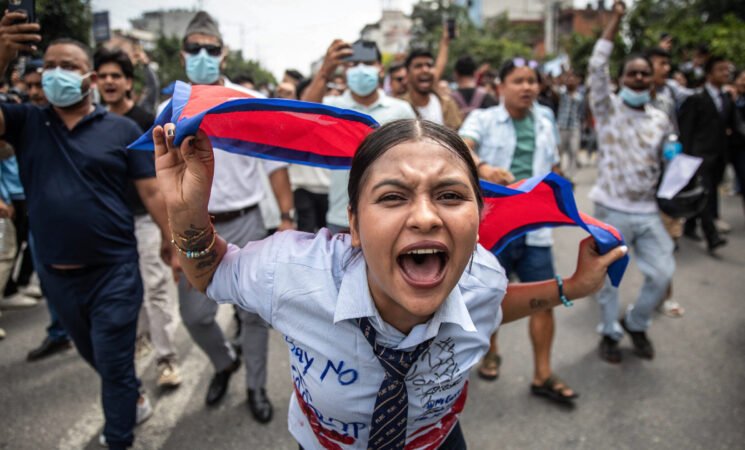12 September 2025, NIICE Commentary 11715
Anaisha Tiwari
Democracy is a complex and evolving process rather than a fixed or permanent condition. In nascent democracies like those in South Asia, it is often marked by crises and factors that place democracy in danger. Democracy in South Asia is dysfunctional, characterised by nepotism, corruption, a lack of transparency and accountability, and a disregard for the rule of law in governance. Although the government system is democratic, marked by periodic elections, the governance process is corrupt and power hungry, reflecting a disturbing paradox.
Corruption fundamentally contradicts the core principle of democracy. Democracy places people at the centre of decision-making, embodying the principle of a government for the people and by the people. However, in a corrupt system, this foundation no longer exists. The script is flipped: instead of serving the interests of the many, it serves the interests of a few. Power becomes concentrated in the hands of elites, while democratic procedures such as elections are reduced to mere performances, creating only an illusion of democracy. The system thus becomes hollow from within, retaining form but losing substance.
Issues of corruption have fueled waves of protest, public unrest and outright revolution in South Asia. The recent September 8, 2025 protest in Nepal placed corruption at the centre. Similarly, the 2024 July revolution of Bangladesh represented a deeper frustration toward the then-government about the discriminatory quota system, corruption among top government officials, and political and economic discontent towards the government. From early 2022 to late 2024, Sri Lanka faced a wave of protests. The causes of protest stemmed from a dysfunctional economy, economic crisis, single-party dominance, deep-rooted corruption in the governance system and increasing cynicism towards Sri Lanka's Political elite and parties. These uprisings reveal that corruption is not only a moral failing but has emerged as a structural threat to democracy.
These moments are outbursts of anger that mark a critical juncture in the democratic trajectories of these nations. As Rousseau puts it, the essence of the social contract is when everyone gives up their individual power, uniting under a general will. A sovereign exists because of a social contract, and government is an agent of the sovereign. When the government acts in their own interest rather than the common good, it violates the social contract. Furthermore, when people are lawfully assembled as a sovereign body, the whole jurisdiction of the state ceases. The recent public protest is an expression of this principle, where citizen collectively reclaim their authority when the government fails to serve the general will.
These moments of political breakdown are not always destructive. These moments are outbursts of anger which mark a critical junctures in the democratic trajectories of these nations. As Hannah Arendt lays out, the revolutionary spirit of freedom serves a dual purpose: one of challenging the existing authority and another of laying the foundation of a new body politic. The protest and uprising in South Asia strive to create a lasting democratic institution.
The period immediately following a protest, such as this, is very critical. While the protest reclaims sovereignty and exposes the structural flaws of the government, rebuilding a durable, sustainable democracy requires deliberate action beyond the streets. The post-revolution fragility determines whether the protest becomes a genuine turning point for the democratic institutions.
The 2006 movement provides a clear example. Although the movement promised democratic transformation, nearly two decades later, the hopes of change remain uncertain. As George Orwell famously wrote, “All animals are equal, but some are more equal than others.” The line, meant to expose the irony of failed revolutions, perfectly resonates with Nepal’s post-2006 transition. The country is trapped in a perpetual state of transition.
Political transitions after protests face unique challenges in being carried forward into a functioning and genuine democracy. The first challenge is how political power is consolidated after the protest. The second is how the agendas of the protests are institutionalised once the protests end. The third is the creation of political norms that transcend the past status quo. Only when progress is achieved on these three fronts can truly democratic institutions be established. These factors play a decisive role in shaping post-protest transitional societies.
When political power is consolidated in the wrong hands, the system becomes more corrupt, or, if it remains in the hands of the existing political elites, the status quo never changes. Equally important is the institutionalisation of the protest’s agenda, which must form the foundation of a democratic program. Finally, there is the realisation of new political norms, an informal phenomenon that is more psychological than material, but essential for long-term democratic transformation.
The protest and uprising from Nepal to Bangladesh to Sri Lanka reflect the fundamental flaw in democratic structures and reveal the need to rebuild them. True rebuilding of democracy lies in what follows after the protest. For democracy to truly emerge, it must consolidate power in accountable hands, institutionalise the spirit of protest and foster a democratic culture that transcends the old status quo.
The views expressed here are the author's own.

